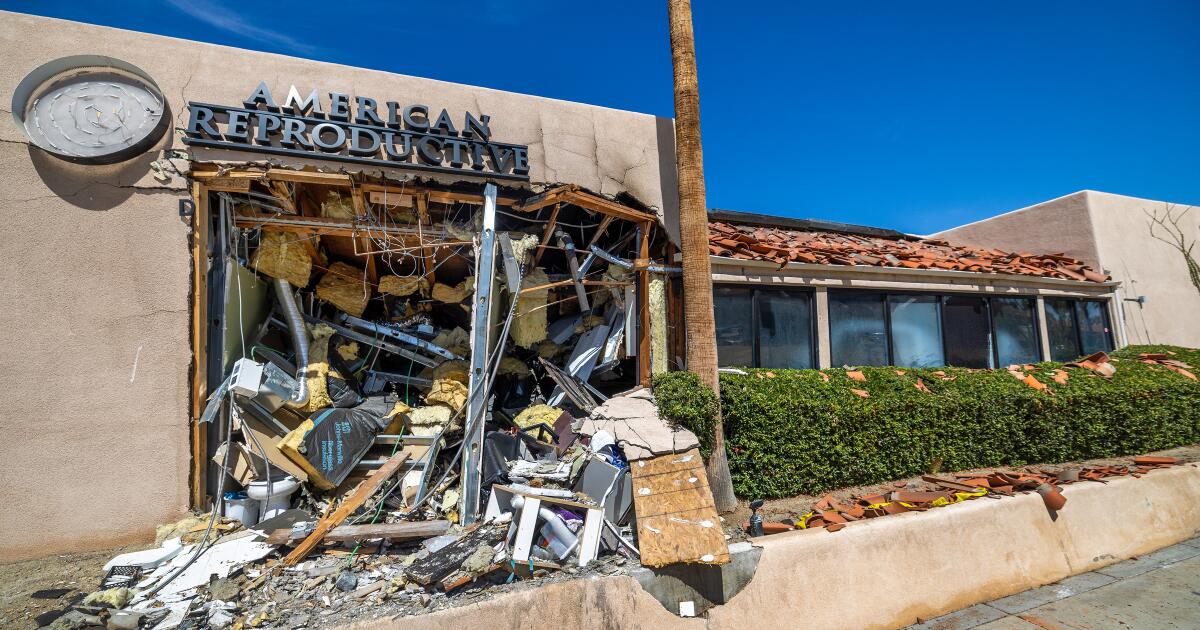Palm Springs Bomb Accomplice Suspect Dies in Federal Custody
Introduction to the Incident
A Washington state man facing terrorism charges related to the bombing of the Palm Springs fertility clinic in Palm Springs has died in custody inside a federal detention facility in Los Angeles, officials said.
Daniel Park, 32, was found unresponsive in his cell at the Metropolitan Detention Center in downtown Los Angeles at about 7:30 a.m. Tuesday, officials said.
“Responding employees initiated life-saving measures, emergency medical services were requested while life-saving measures continued,” according to a statement from the Department of Justice. “Mr. Park was transported by EMS to a local hospital and subsequently pronounced deceased by hospital personnel.”
No one else was injured and no further details on the cause of death were immediately available.
Background on the Suspect and Charges
Park had been in federal custody since his arrest at John F. Kennedy International Airport earlier this month and was charged with providing and attempting to provide material support to a terrorist.
He was accused of helping Guy Edward Bartkus secure 270 pounds of ammonium nitrate, an explosive precursor that can be used to construct homemade bombs.
DMV handout photo of Daniel Park.
(FBI)
Bartkus, 25, is suspected of detonating a bomb at American Reproductive Centers in Palm Springs on May 17, killing himself and injuring four people. The blast created a debris field spread across 250 yards.
Investigation and Evidence
Days after the bombing, authorities say, Park left the U.S. for Europe. Polish law enforcement eventually detained him and deported him back to the United States, where he was taken into custody upon arriving in New York. When Park was confronted by Polish authorities, he attempted to harm himself, according to an FBI affidavit. Park made his initial appearance in federal court in Brooklyn before being transferred to Los Angeles.
Park was accused of shipping approximately 180 pounds of ammonium nitrate in January and later paying for an additional 90 pounds of the chemical to be shipped to Bartkus in the days leading up to the Palm Springs attack.
Bill Essayli, the top federal prosecutor in Los Angeles, said that Park spent two weeks visiting Bartkus in Twentynine Palms in late January and early February. Three days before Park arrived at his house, according to a federal criminal complaint, Bartkus researched how to make powerful explosions using ammonium nitrate and fuel.
Bartkus and Park allegedly ran experiments together in Bartkus’ garage, from which the FBI recovered large quantities of chemical precursors and lab equipment after the bombing.
Ideology and Motivations
According to FBI Assistant Director for Los Angeles Akil Davis, Park had a similar ideology to Bartkus and posted about these ideologies on internet forums dating back to 2016.
FBI case investigators, as well as law enforcement sources, characterize Bartkus as having “antinatalist” ideations.
In public posts online, he argued that procreation without the consent of the unborn is unethical and unjustifiable in a world struggling with environmental harm, violence and overpopulation.
“Park’s social media posts indicate that he was attempting to recruit others of like-minded ideology,” Davis said. He added that the alleged partnership between Park and Bartkus was one of “equal, mutual like-minded individuals finding themselves on the internet in these chat forums.”
“They don’t believe people should exist,” Davis said.
Investigation Findings
Search warrants conducted at Park’s residence in Kent, Wash., in the wake of the bombing led agents to identify his role in the explosion, according to Davis.
Davis said six packages of ammonium nitrate were shipped from Park in Seattle to Bartkus. He said officials are awaiting the results of an analysis of the explosive precursor chemicals shipped from Park.
The FBI described the Palm Springs blast — powerful enough to damage buildings several blocks away — as “probably the largest bombing scene that we’ve had in Southern California,” eclipsing the 2018 bombing of a day spa in Aliso Viejo.
Conclusion
The death of Daniel Park, a suspect in the Palm Springs bombing, brings a close to one chapter of the investigation but leaves many questions unanswered. The Palm Springs bombing is a stark reminder of the dangers of terrorism and the importance of vigilance in preventing such acts. As the investigation continues, it is crucial to understand the motivations and ideologies behind such violent acts to prevent future occurrences.
FAQs
Q: What were the charges against Daniel Park?
A: Park was charged with providing and attempting to provide material support to a terrorist.
Q: What is the current status of the investigation into the Palm Springs bombing?
A: The investigation is ongoing, with authorities analyzing evidence and following leads to understand the full scope of the incident.
Q: What was the ideology of the suspects involved in the Palm Springs bombing?
A: The suspects, including Daniel Park and Guy Edward Bartkus, were characterized as having “antinatalist” ideations, believing that procreation without the consent of the unborn is unethical.
Q: How did the suspects plan and execute the bombing?
A: The suspects allegedly ran experiments together, shipped explosive precursors, and researched how to make powerful explosions using ammonium nitrate and fuel.
Q: What is the significance of the Palm Springs bombing?
A: The bombing is considered one of the largest in Southern California, highlighting the dangers of terrorism and the importance of preventing such acts.


